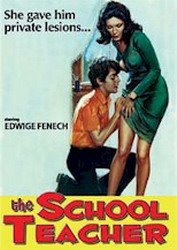 No, no, no. Not that kind of grading...
No, no, no. Not that kind of grading...Book-grading terms are always controversial and usually good for a few hundred bickering emails whenever the topic comes up on an email list. Over the years I've come up with a system of my own, which I now humbly offer to the honorable book-buying public as well as my fellow bookselling scum-
AS NEW: Literally "new". Since most books, once read or even handled, no longer qualify for the term NEW, the use of the qualifier "AS" has led to some controversy, with opponents pointing out that a book is either in new condition or it isn't. Proponents and opponents like to bicker about this point, and can usually only be distracted from it by the sound of someone dropping the phrase "VERY FINE" into the conversation.
FINE: A controversial term for a grade which may or may not exist, denoting a book that has slight wear that disqualifies it from the grade AS NEW, which also may or may not exist. Opponents contend that any book that has been handled cannot qualify for a grade above "NEAR FINE". Proponents generally counter this argument by asking Opponents how many angels they think can dance on the head of a pin.
VERY FINE: A grade between FINE and AS NEW. If the grade "FINE" has been controversial over the years, it has nothing on the long, confused and violent history that has attended the use of the grade VERY FINE. The Bern Convention of 1826 officially allowed the term and defined it as any book showing no signs of wear except for an allowance of 2.5 creases not to exceed .0005 mm. in depth, or bumps on the corners not to exceed 5 microns. Smudges were specifically disallowed, but this was amended by the Paris Treaty of 1887, which allowed for up to 3 smudges with a square area not exceeding 21 mm. The controversy over this point led to the Expulsion of English Booksellers from the Continent in 1889. Although English booksellers were re admitted after the Compromise of 1895, under which smudges up to 37 square mm would be allowed, the bad feelings left in the wake of this controversy are believed by many historians to have been one of the indirect causes of the First World War. Used today by many booksellers on Ebay. Not to be confused with "Very Fined (tm)", which usually means the book has fruit juice stains.
NEAR FINE: Either the top grade even a new book, just out of the box from the publisher, can have, or a grade denoting some general wear. The fact that these two conditions are not at all the same cuts no ice with the NearFiners(tm). Take your pick about which side you are on and hope whoever you are discussing this with agrees with you, or else you are likely to end up with a book stuffed up your nose.
GOOD: Not good. An archaic term mostly used nowadays by bored brick & mortar booksellers who amuse themselves by explaining to befuddled walk-in customers that the term "Good" technically means "Not Good", leaving the befuddled customers to wonder what planet booksellers come from.
FAIR: Poor. Getting the hang of it by now?
POOR: Don't even think about buying it. It not only is probably lacking its covers, some pages and all the illustrated plates, but may well leave you with a nasty rash...
OTHER GRADES-
ELSE FINE: A grade used to describe the most minute portion of a book which has been left undamaged. As in: "Ex-library with stamps, embossures, and orange-day-glo spine numbers; covers warped; hinges reinforced with duct tape; 3 plates with crayon scrawls, slight mold odor; pages 47-52 with newspaper recipes glued over text; else fine.
EX-LIBRARY: See "ELSE FINE".
MINT: Another controversial term, used by some booksellers as a synonym for AS NEW. A 1978 research study by Tulane University discovered that the term is mostly used by booksellers who collected coins as children. The study further found that the booksellers who object to it most vociferously collected stamps as children, thus basically boiling the controversy down to the old "stamps" vs. "coins" argument that most of us had with friends at the age of 8 and had left behind by the age of 10.

2 comments:
All my books are Super Dooper Fine with gravy and a cherry on top!
(I have GOT to stop cataloging in the kitchen.)
Now see, I'd always been told that only gravy-less books could be graded Sooper-Dooper Fine, but that's probably wrong.
I don't see a problem with it. Are they minty?
Post a Comment